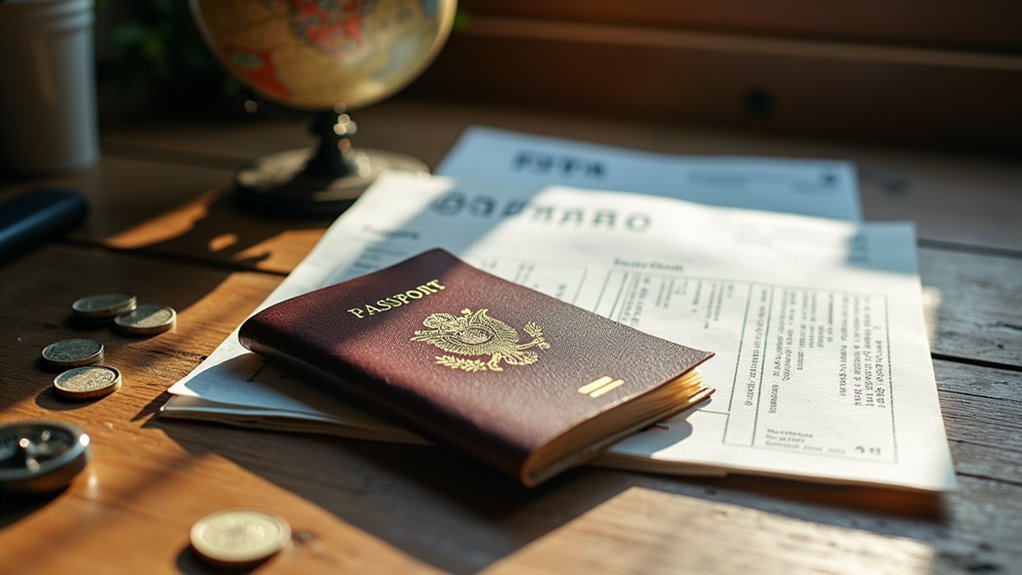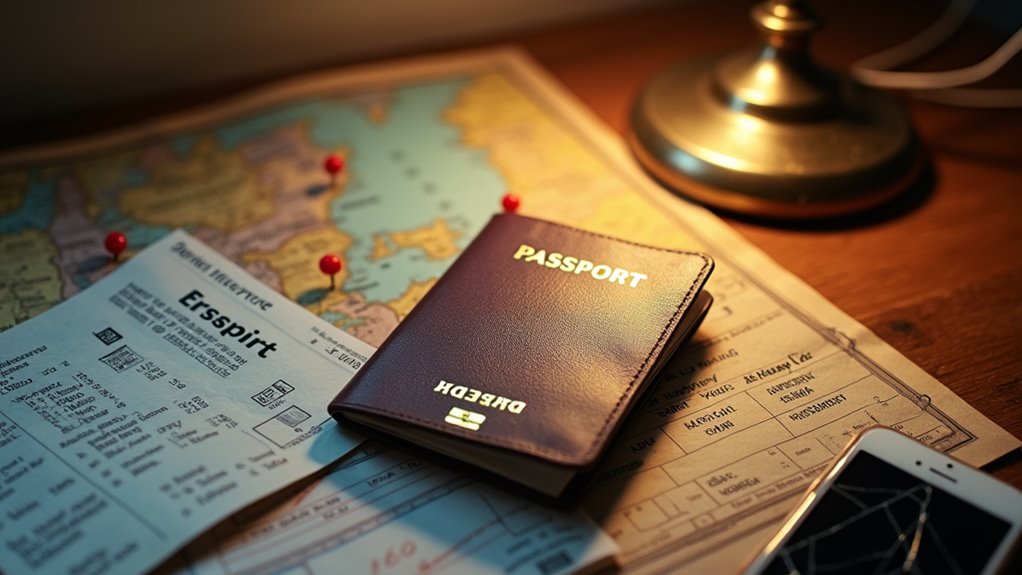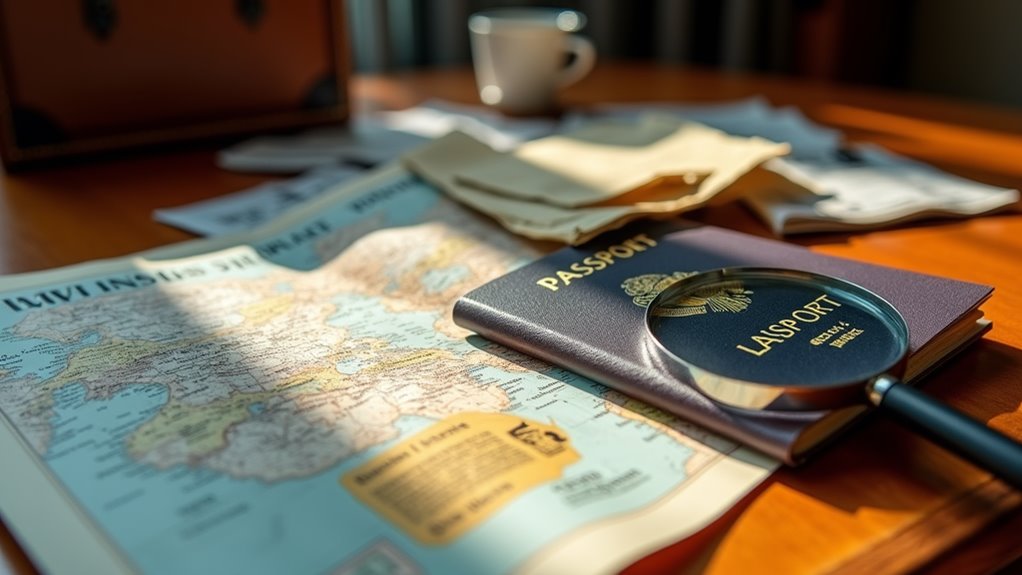Travel insurance isn't a one-size-fits-all decision, but it's essential for high-stakes trips like international travel, cruises, or expensive vacations. You'll want coverage if you've made significant non-refundable bookings or if you're heading to areas prone to natural disasters. Basic plans cost about 3-5% of your trip cost and cover cancellations, medical emergencies, and lost baggage, while premium plans run 7-10% but offer comprehensive protection including "cancel for any reason" options. With average claim recoveries of $2,500, the right policy can save you thousands and provide crucial peace of mind. Understanding your options and coverage needs will make the choice crystal clear.
Key Takeaways
- Travel insurance becomes essential for international trips, expensive vacations, and non-refundable bookings where potential losses exceed $5,000.
- Basic coverage costing 3-5% of trip value suffices for domestic travel, while premium plans offer comprehensive protection for complex itineraries.
- Medical coverage abroad is crucial since many health insurance plans, including Medicare, don't provide international coverage.
- Insurance is particularly valuable during hurricane season, winter travel, or visits to regions with political instability.
- Claims require thorough documentation and prompt reporting, typically within 20-30 days, making preparation and organization essential.
What Travel Insurance Actually Covers

While many travelers assume travel insurance only covers trip cancellations, comprehensive policies typically protect against a wide range of unexpected events. Your policy might cover emergency medical expenses, medical evacuation, lost or delayed baggage, travel delays, and trip interruption costs.
Most policies will reimburse you if you need to cancel your trip due to illness, injury, death in the family, natural disasters, or terrorism at your destination.
You'll also find coverage for missed connections, stolen belongings, and rental car damage. If you're traveling internationally, your insurance can cover emergency dental work and prescription replacement.
Some premium policies even include coverage for adventure sports, pre-existing medical conditions, and "cancel for any reason" options, though these usually come at a higher cost.
Common Travel Insurance Policy Types
Travelers typically encounter three main types of travel insurance policies: basic/limited coverage, mid-range comprehensive plans, and premium all-inclusive packages.
Basic coverage usually protects against trip cancellation, brief medical emergencies, and lost baggage, but with lower coverage limits and more exclusions.
Mid-range comprehensive plans offer higher coverage limits and include additional benefits like emergency medical evacuation, rental car protection, and adventure sports coverage.
Premium packages provide the highest level of protection with features like "cancel for any reason" options, primary medical coverage, and concierge services.
They'll also cover pre-existing conditions and often include benefits like missed connection coverage, pet care, and business equipment protection.
While more expensive, these plans offer peace of mind for luxury trips or complex itineraries.
When You Need Coverage

Although not every trip requires insurance coverage, certain situations make travel protection especially important.
You'll want coverage when you're planning an expensive vacation, traveling internationally, or booking non-refundable arrangements. It's also crucial if you're visiting areas prone to natural disasters or political unrest.
Consider travel insurance if you're cruising, since medical evacuations at sea can be extremely costly.
You should also get coverage if you have health conditions that might interrupt your trip, or if Medicare is your primary insurance, as it typically doesn't cover overseas medical care.
If you're traveling during peak hurricane season or winter months when weather delays are common, insurance can protect your investment.
Senior travelers and those planning adventure activities should prioritize coverage due to increased risks.
Cost Vs Potential Savings
When comparing basic and premium travel insurance options, you'll find coverage differences that can range from a few hundred to several thousand dollars in potential claims.
You'll reach a price breaking point where premium coverage becomes worth the extra cost when your trip expenses exceed $5,000 or include activities with higher risk factors.
Real claims data shows that travelers who file insurance claims recover an average of $2,500 per incident, making coverage particularly valuable for international trips and luxury vacations.
Comparing Basic Vs Premium
Understanding the cost-benefit relationship between basic and premium travel insurance can significantly impact your vacation budget.
Basic plans typically cover essentials like trip cancellation, basic medical emergencies, and lost baggage at a lower price point. You'll often pay 3-5% of your total trip cost for basic coverage.
Premium plans offer enhanced protection with higher coverage limits and additional benefits like adventure sports coverage, rental car protection, and "cancel for any reason" options.
While you'll pay 7-10% of your trip cost, premium coverage can save you thousands if something goes wrong. Consider premium insurance for international trips, expensive vacations, or when traveling to remote destinations.
Basic coverage might suffice for domestic trips or shorter stays where risks are lower.
Policy Price Breaking Points
Before purchasing travel insurance, you'll need to calculate your trip's financial "breaking point" – the threshold where potential losses outweigh policy costs.
Look at your total non-refundable expenses, including flights, accommodations, tours, and activities. Compare this amount to insurance premiums, which typically range from 4% to 10% of your total trip cost.
Consider your risk factors: traveling during hurricane season, visiting remote locations, or booking expensive luxury packages all increase your potential losses.
If you're spending $5,000 or more on a trip, insurance becomes more worthwhile. For shorter, domestic trips under $1,000 with flexible booking options, you might skip coverage.
Remember to factor in valuable benefits like emergency medical coverage and evacuation services, which can save you thousands in unexpected situations.
Real Claims Cost Analysis
Real-world travel insurance claims reveal the actual cost-benefit ratio of purchasing coverage.
When you analyze claim data, you'll find that medical emergencies abroad typically cost between $15,000 and $50,000, while emergency evacuations can exceed $100,000. These expenses dwarf the average policy cost of $150 to $500 per trip.
Consider this: a broken leg in Europe could cost $20,000 without insurance, but you'd only pay your deductible with coverage.
Trip cancellation claims average $3,000, and lost baggage settlements range from $500 to $2,500.
With comprehensive policies covering multiple scenarios, you're effectively buying protection against expenses that could otherwise deplete your savings.
The math becomes clearer when you compare potential losses against premium costs, especially for international travel.
Reading the Fine Print

While most travelers focus on coverage limits and premium costs, the fine print in travel insurance policies often contains crucial details that could make or break your claim.
You'll need to understand exclusions, reporting deadlines, and documentation requirements to ensure you're truly protected.
Pay special attention to pre-existing condition clauses, activity restrictions, and destination-specific limitations.
Your policy might exclude adventure sports, certain countries, or medical conditions diagnosed within a specific timeframe.
Look for time-sensitive provisions, like the deadline to file a claim after an incident or requirements to notify your insurer before seeking medical treatment.
Don't skip over definitions sections, as insurers often have specific interpretations of terms like "immediate family," "natural disaster," or "travel delay."
Filing a Successful Claim
Filing a successful travel insurance claim requires three essential steps: documenting everything, following procedures precisely, and meeting all deadlines.
Take photos of damaged items, keep all receipts, and collect written statements from witnesses or authorities when incidents occur. Don't discard any evidence until your claim is fully resolved.
Contact your insurance provider immediately after an incident and request their specific claim forms.
You'll need to submit detailed documentation within the specified timeframe, usually 20-30 days. Complete all sections of the forms accurately and include supporting documents like medical records, police reports, or airline statements.
Make copies of everything you submit.
Track your claim's progress and respond promptly to any requests for additional information.
If your claim is denied, you have the right to appeal within the stated period.
Real Stories From Insured Travelers

Travel insurance success stories demonstrate how vital coverage can be when unexpected events disrupt your plans.
Consider Sarah's experience when her mother suffered a heart attack two days before their Mediterranean cruise. Her policy's trip cancellation coverage reimbursed $12,000 in non-refundable expenses.
Then there's Mike, who broke his ankle hiking in New Zealand. His travel insurance covered medical evacuation, hospital bills, and additional accommodation costs – expenses that would have totaled over $35,000.
Another traveler, Rachel, had her luggage lost during a layover in London. Her policy provided $2,500 for replacement items, allowing her business trip to proceed smoothly.
These real-world examples show how travel insurance protects your investment and provides peace of mind when traveling.
Frequently Asked Questions
Can I Buy Travel Insurance After Booking My Trip?
Yes, you can buy travel insurance after booking your trip, but it's best to purchase it within 14-21 days of your initial trip deposit.
This window often gives you access to additional benefits, like pre-existing condition coverage.
You can technically buy insurance until the day before you depart, but waiting too long may limit your coverage options and increase the risk of claim denials.
Is Travel Insurance Tax Deductible for Business Trips?
You're in luck when it comes to business travel insurance!
If you're traveling for legitimate business purposes, your travel insurance premiums are typically tax deductible as a business expense.
Just be sure to keep detailed records of your coverage, payments, and how the trip relates to your business activities.
Does My Credit Card's Travel Protection Replace the Need for Insurance?
While your credit card's travel protection can provide some coverage, it's not usually comprehensive enough to replace dedicated travel insurance.
You'll need to carefully review your card's benefits, as they typically offer limited coverage for trip cancellation, lost baggage, and rental cars.
Most credit cards don't cover medical emergencies abroad or evacuation costs, which are crucial components of comprehensive travel insurance.
How Do Pregnancy and Pre-Existing Conditions Affect Travel Insurance Eligibility?
Most travel insurance policies won't cover routine pregnancy care, but they'll typically cover unexpected pregnancy complications.
For pre-existing conditions, you'll need to seek special coverage or a pre-existing condition waiver. You must purchase this waiver shortly after making your first trip payment.
Be upfront about your medical history, as undisclosed conditions could void your coverage when you need it most.
Can I Get Travel Insurance if I'm Already Abroad?
While you can get travel insurance after departing, most providers won't cover you for events that have already started.
You'll need to find insurers specifically offering "already traveling" or "expatriate" coverage.
Be prepared to pay higher premiums, and understand that there's typically a waiting period before coverage begins.
For the best protection and rates, you should always purchase insurance before leaving your home country.
Conclusion
Standing at the airport terminal, passport in hand, you'll need to weigh your travel insurance decision carefully. Like an umbrella on a cloudy day, it's better to have coverage and not need it than face storm clouds without protection. Whether you're scaling Mount Kilimanjaro or lounging on Maui's shores, smart insurance choices can transform potential travel nightmares into minor bumps along your journey's path.

Leave a Reply